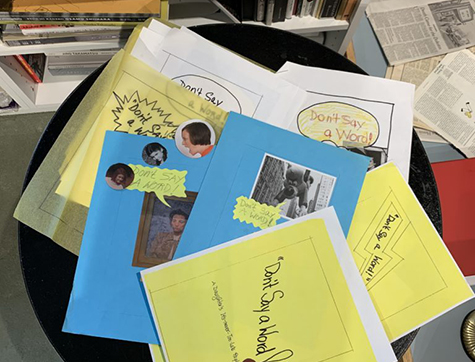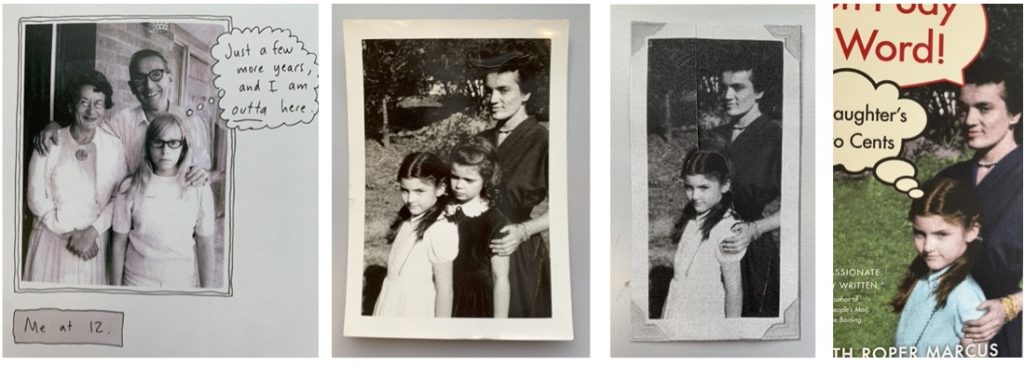It’s not surprising that when you have spent your life worrying that your words will be pounced on and held up for scrutiny by nitpicking judges, writing what you want can take more courage than you have. Particularly if it is the nitpicking judges that you want to write about. You will need a mentor beside you, someone who can make the task seem doable—and doable by you. Lucky for me, Roz Chast and her graphic memoir, Can’t We Talk About Something More Pleasant?, arrived at just the right moment.
I had written several drafts of my own memoir, Don’t Say a Word!: A Daughter’s Two Cents, by the time I read Chast’s and was astonished to find that we had written the same book. Her back cover describes her memoir as, “the story of an only child watching her parents age well into their nineties and die.” My story exactly! Not only that but Chast’s book seems to be the only other memoir that gives a soup to nuts account of an experience almost all of us are doomed to have: watching our parents’ journey to death. On top of that, despite the grim details, Chast’s memoir manages to be hilarious, as mine aims to be. And last but not least, Chast (although at this point I feel I should be calling her Roz) turns out to be my long lost twin: we share the same terrifying, tyrannical mother! Then, Roz, too, wears her neurosis on her sleeve. Her parents were also too preoccupied with themselves to notice her. She failed just as miserably to get them to listen to her. And she, too, dealt with the whole end-of-life nightmare by writing about it, comically. We are identical twins.
OK, there are differences. I am not a famous New Yorker cartoonist beloved the world over. I did not write a graphic memoir. In Roz’s book, the parents’ unraveling is the whole plot, and Chast and her parents are the only characters, whereas in my book, the parents run off to Mexico and get into trouble with a string of oddball misfits. And then, our upbringings had nothing in common (beyond being Jewish New Yorkers with the same mother…) But let’s not quibble.
Roz was there when I needed her. I was intent on telling the whole story, with all its gritty details: what went on within the walls of our apartment and between my parents, how I became my anxious self, how their judgment took flight and where that landed them, what their love letters said about them, who they turned out to be behind their masks—all things they would not have wanted anyone to know! And even if they weren’t watching from the grave, what about the anonymous reader who might be appalled that a daughter was airing things better kept private? It was enough to stop anyone from speaking up, let alone someone just emerging from a lifetime of keeping quiet.
But Roz had done it. She had described the Vaseline jar and old rubber bands of her parents’ lives and found the funny in it. She hadn’t sugarcoated their flaws or her desperation to escape them, and still she had not mocked them. She brought her parents to life in all their particularity, and yet her story is universal. Her book validated what I was trying to do and gave me permission to omit nothing.
I kept it on a shelf over my desk where it served as a beacon, illuminating the way forward. It reassured and blessed, like a bible. “Don’t mince words,” it said.
Roz’s fingerprints aren’t visible in my book—but they are all over the cover. I had always intended to illustrate each chapter with a related photo and imagined continuing with a grid of family snapshots on the cover. I wanted to remind readers that this was a true story and one that considered the ongoing impact of the past on the present. I love the way memoir photos anchor the actual people and places in their moment and make them real in a way the text can’t.
But when I sent the publisher a selection of family photos that might fit into a grid, she pointed out that they didn’t connect with the title, Don’t say a word!, which is a quote. She was right. She suggested I find a photo in which my mother could be speaking the title—a great idea. I hunted and hunted through the albums and boxes of photos with increasing frenzy, but the image simply did not exist.
Then began a wild goose chase for an alternative: a forbidding portrait of my mother painted by an uncle, images of angry mothers from the internet, and my attempts to draw the words in a cartoon bubble suggesting angry speech, with radiating rage lines or in the shape of a descending, threatening bolt of lightening. The publisher was not persuaded. Worse, she was becoming panicked that I was out of control and running for the cliff.
Around this time, I began to focus on Rox Chast’s photo of herself at twelve with a thought bubble in which she is imaging her escape, with her oblivious parents, smiling cheerfully behind her. How perfect! I loved the emotional space between Chast and her parents, the way she was already living in a different world. She was stuck—but not forever.
I returned to the albums again and again and again. There were hundreds of pictures of my mother but only six where she and I appear together. Finally I settled on one in which my mother and I are looking sideways at the camera, she sort of snidely and I sort of impishly. The only trouble was the child standing between us.
On a copy, I “photo-shopped” this now-forgotten friend out with a pair of scissors to test the result, and the book designer made it work. She also thought to put the subtitle in a thought bubble emerging from me. What a gift that she and the publisher were willing to let me collaborate. Roz smiles at me though the cover.
If you don’t have the guiding light you need by your side, find her in the wide world. You won’t even need her consent. Never underestimate the power of an idol: admiration can lead to identification can lead to inspiration. Julia Childs convinced me I could cook; Roz Chast convinced me I could tell my story.


Elizabeth this is wonderful. I did know about you and Roz being buddies It’s a great story
I’m so thrilled you liked it!
So who knew you are such a good story teller?
Your book is on our dinning room table. Have a great day.
I’m so, so glad you think so!
I love how you’ve described Roz Chast inspiring you, and “setting you free”. Thanks for describing the evolution of the cover photograph- a puzzle’s creative solution!